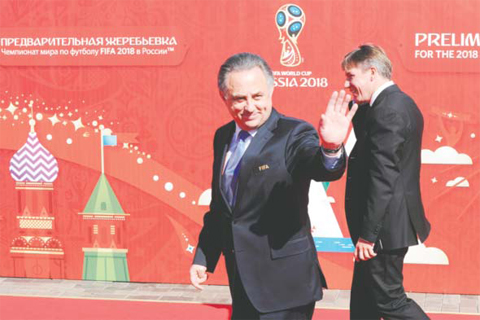 Russian Sports Minister Vitaly Mutko (L) arriving to attend the preliminary draw for the 2018 World Cup qualifiers at the Konstantin Palace in Saint Petersburg
Russian Sports Minister Vitaly Mutko (L) arriving to attend the preliminary draw for the 2018 World Cup qualifiers at the Konstantin Palace in Saint PetersburgMOSCOW: Russia rejected yesterday explosive accusations of doping and corruption and promised a rapid response to avoid suspension from the 2016 Olympics due to the scandal that threatens to spread far beyond the borders of Russia and athletics. “Until any proof has been put forward it is hard to accept any accusations as they seem rather groundless,” Kremlin spokesman Dmitry Peskov stated.
Meanwhile, the Moscow antidoping laboratory was stripped of its accreditation by the World Anti-Doping Agency (WADA) in the first concrete measure taken since the publishing of a damning report by a WADA independent commission. Athletics was rocked by allegations of Russian “state-sponsored” doping contained in the report published on Monday. IAAF president Sebastian Coe has given the Russian athletics federation (ARAF) “until the end of the week” to respond or risk possible suspension. Despite the Kremlin’s dismissive reaction, ARAF assured Coe that it would contact the IAAF “in the very near future” outlining its anti-doping programme and “its reaction to the deductions and conclusions” in WADA’s report.
Calls for Russia, fourth in the 2012 London Olympics medal table, to be banned from next year’s Olympic Games are growing. UK Athletics chief Ed Warner told BBC Radio 4: “Lord Coe... says that his (IAAF) council is meeting on Friday or Saturday to consider sanctioning Russia and possibly to suspend them. My strong advice would be: you’ve absolutely got to do that.” That view was echoed by Australia’s national Olympic Committee. “We would very much support Russian track and field athletes not being allowed to compete in Rio if their federation is not code-compliant to WADA,” the 2016 Australian Olympic team’s chef de mission Kitty Chiller said in Sydney. “If Russia is not in Rio, I think the reputation of athletics will be enhanced because the public will know every athlete competing is clean and is competing in the true spirit of the Olympic Games.” The crisis engulfing the sport long-viewed as the flagship of the Olympic Games comes hot on the heels of FIFA’s own corruption turmoil. And worryingly according to WADA, the athletics scandal is by no means confined to Russia nor athletics.
“Russia is not the only country, nor athletics the only sport, facing the problem of orchestrated doping in sport,” the report, triggered by German broadcaster ARD’s documentary last December, warned. WADA’s independent commission chairman Dick Pound added: “We certainly do not think that Russia is the only country with a doping problem and we don’t think athletics is the only sport with a doping problem. “It seems pretty clear from both the ARD programme and subsequent developments that Kenya has a real problem. It’s been very slow to acknowledge that there is a problem.” “If they don’t do a good job (investigating doping) then I think somebody else will do a job for them.”
According to several anti-doping specialists, the risk of abuse is especially high in countries with strong rulers. “Frauds like this can only be State-run with secret service involvement,” a specialist who wished to remain anonymous told AFP. He raised the case of China, recalling that in the build-up to the 2008 Beijing Olympics a German reporter posed as a swimming coach in search of finding ways to improve performance. — AFP










